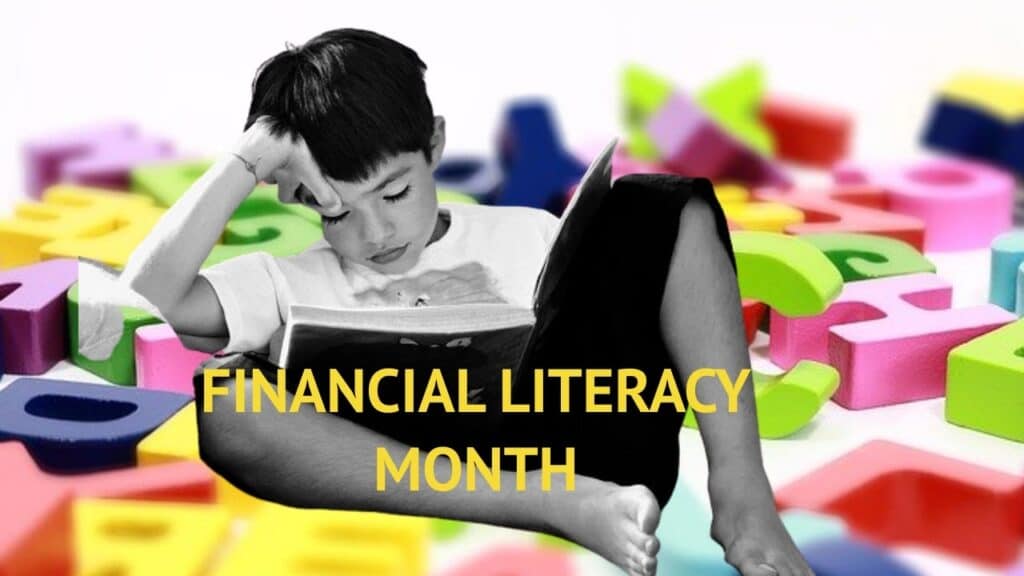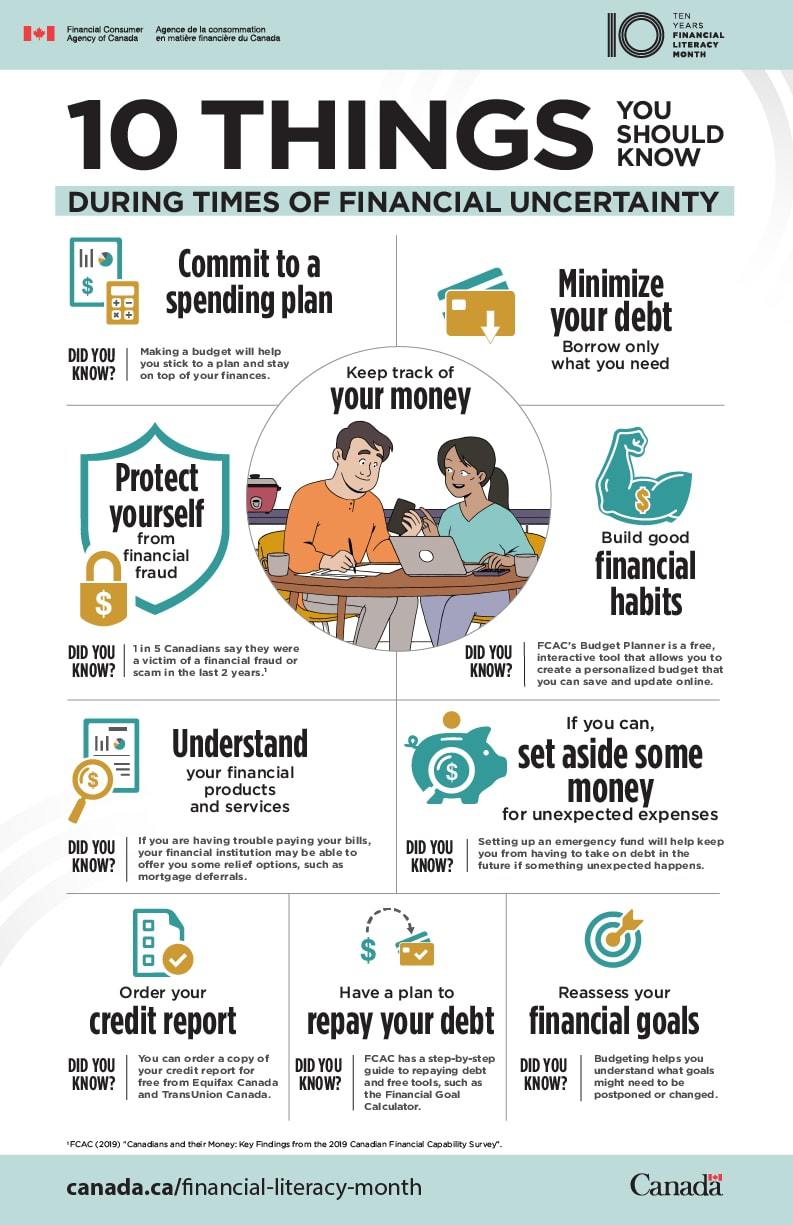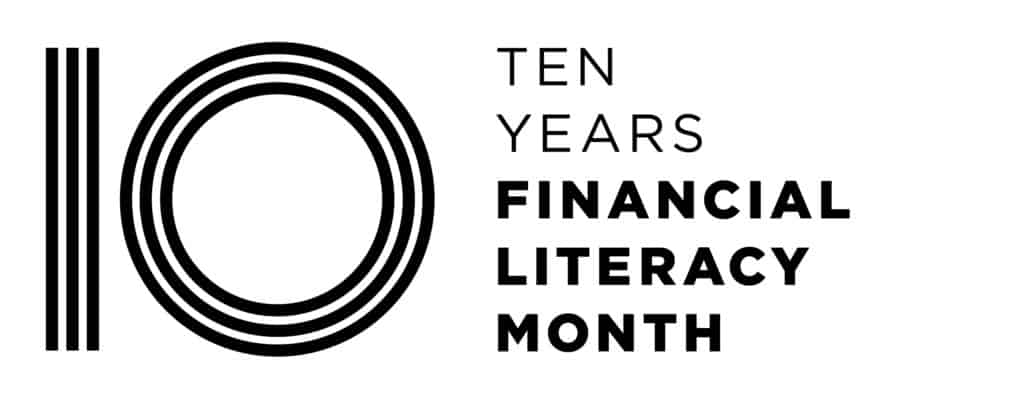<h2Financial Awareness Month
Financial Awareness Month: Introduction
In today’s world, it is essential to have a good understanding of money matters and exactly how to handle your money carefully. November is Financial Awareness Month in Canada. In the United States, April is Financial Literacy Month. These two months chosen as Financial Awareness Month does not make any sense to me. At the beginning of every New Year, many people resolve to better themselves. One common resolution deals with gaining more financial literacy or reducing the amount of debt a person carries. So shouldn’t January be Financial Awareness Month?
In this Brandon’s Blog, we want to help raise the public awareness of Canadian financial literacy. We try to talk about the importance of financial literacy by covering the following money tips:
- How Financial Awareness Month emphasizes understanding financial literacy for prudent money management.
- Key aspects of financial literacy include distinguishing needs from wants, the importance of budgeting, wise debt handling, and saving for a secure future.
- The significance of financial literacy for empowerment, achieving goals, and the basics of managing money effectively.
- The power of compound interest, the role of different account types (savings, chequing, credit cards), and the need for consistency in financial planning.
- Overall, Canadian Financial Awareness Month guides individuals toward a path of financial literacy and concludes by emphasizing its importance.
By the end of this article, you will be geared up with the needed tools to make informed financial choices and develop a safe future on your own.
Financial Awareness Month: Understanding the Difference between Needs and Wants
One way to show economic awareness is with story-telling. It is additionally an excellent way to show youngsters. The perfect time to begin your financial journey and achieve financial literacy to make better financial decisions is when you are young. So below is our Financial Awareness Month way to comprehend the difference between wants and needs.
For individuals like Sarah, it continues to be necessary to juxtapose their needs versus their wants. We need to be critical of what adds to health and basic survival and what engenders joy and satisfaction. By doing so, it can create judicious financial paths, thus guaranteeing a secure and prosperous future.
At daybreak, the sun’s radiant beams adorned the sky, setting the stage for Sarah’s jubilant awakening on the most exceptional day of the entire year – her birthday, a day bathed in splendour! An exhilarating surge of anticipation coursed through her veins, propelling her swiftly downstairs. Each pulsation of her heart carried the palpable thrill of what lay ahead. Like a harmonious chorus of affection, birthday greetings from her devoted parents and heartfelt presents from her beloved friends and family shimmered akin to celestial bodies, enveloping her in a tender embrace. And as the pinnacle of it all, an enticing breakfast awaited her, a sumptuous banquet befitting royalty.
As Sarah and her parents head out to the toy store, Sarah’s father starts to explain the relevance of distinguishing between needs and wants. He pointed out that needs, such as food, water, clothes, and a roof over your head, are important for survival, whereas wants, although not essential, can bring happiness and contentment.
Infused with the enchantment of her birthday, Sarah embarked on a spree of shopping, her thoughts teeming with vivacious hues. She delved profoundly into the recesses of her wants and yearnings, unravelling a newfound comprehension of her financial expedition. With every step, her assurance ascended, enabling her to make astute selections. Resolute in seizing every available prospect, the cosmos appeared to whisper boundless prospects into her eager receptiveness. With inexhaustible vitality and resolute determination, Sarah ventured forth into the realm, poised to inscribe her effervescent dreams upon life’s intricate canvas.
Sarah, at the ripe age of ten, radiated sheer delight while commemorating her birthday. Her parents she adores had pledged an extraordinary gift—a fresh, handpicked toy of her preference—eliciting an eager anticipation to uncover its identity.
Entering the toy emporium, Sarah basked in contentment regarding all her possibilities. Methodically weighing her options, she meticulously selected items aligning with her wants within the financial bounds set by her parents. Her father commended her fiscal acumen, affirming, “Impressive Sarah”.
At that same moment, Sarah began to examine her genuine needs versus cravings. She discerned that, notwithstanding her yearning for that new doll, a more pragmatic choice was to leave the toy store in search of a fresh pair of shoes, given the discomfort stemming from her current footwear. She realized that distinguishing between desires and necessities marks the primary stride toward creating an astute financial ecosystem.
When she told her parents what she was thinking, her father said “Sarah,” her papa inquired, “you have just stopped yourself before deciding on a toy to think about your true needs versus your wants?” Considering for a moment, Sarah responded, “I need nourishment, hydration, and a place to live. I also need to have a comfortable pair of shoes for when I walk to and from school. However, I want the unique toy showcased on the television.” Her papa responded sagely, remarking, “Indeed, Sarah. Prioritizing requirements over desires is a critical aspect of our decision-making.”
In the ensuing weeks, Sarah continued to refine her prioritization of necessities and demands. Accepting the understanding that not all needs held equal significance for her total health, she embraced a conscientious approach to expenditures, assigning her allowance deliberately. Sarah was well on her way to acknowledging all her desires, but to focus her spending plan and to be monetarily accountable.

Financial Awareness Month: The Importance of Budgeting
In the hamlet of Thriftyville, a tale unfurled about a young inhabitant named Lindsay. Lindsay epitomized diligence, nurturing aspirations of fiscal fortitude and triumph. Alas, despite her toil, she grappled incessantly to meet her needs, perennially falling short of the resources necessary to meet her goals.
A pivotal moment dawned upon Lindsay when she resolved to emancipate herself from the cycle of paycheque constraints and perennial financial anxieties. Determined to metamorphose her circumstances for better financial outcomes, she embarked on a quest to seize command over her finances. It was then that she unearthed the potent tool of budgeting.
Crafting a budget transcended mere numerical exercises—it epitomized a transformative ethos. By orchestrating expenditures in alignment with earnings, she orchestrated a symphony ensuring every cent found purpose and she was able to begin living within her means. It resembled charting a course, endowing her finances with a navigational blueprint, directing them precisely toward their intended and necessary destinations.
Lindsay, emboldened by a newfound resolve, seated herself at her kitchen table, meticulously listing her diverse streams of income. Her list encompassed her steady salary, occasional side endeavours, and sporadic monetary gifts from her doting parents. A semblance of optimism flickered within as the numbers aggregated—a faint whisper of possibility that perhaps this approach to budgeting held promise.
Subsequently, Lindsay meticulously cataloged her outflows, meticulously categorizing them into segments—rent, utilities, groceries, transportation, income tax and leisure. The revelation of where her finances ebbed was illuminating. It dawned upon her that her expenditures in dining out and retail therapy eclipsed her initial estimations.
Armed with a comprehensive picture of her earnings and spending, Lindsay initiated adjustments. She opted to curtail her dining escapades, embracing the culinary arts within her abode. Additionally, she terminated her dormant gym subscription, opting for invigorating runs through the verdant park instead. These minor alterations facilitated the liberation of surplus funds, earmarked for her savings goals.
Among Lindsay’s aspirations loomed the ambition to nurture an emergency reserve. The apprehension of unforeseen job loss or an unscheduled emergency had perennially plagued her thoughts. Entrusting her budget to allocate a designated sum each month toward this contingency fund furnished her with a semblance of solace, a shield against uncertainties, fostering a tranquil state of mind.
Over time, the fruits of Lindsay’s budgeting labour began to manifest. She discerned a notable shift—no longer tethered to credit cards to bridge fiscal gaps, she accelerated the payment of her debts. Furthermore, a newfound mastery over her finances imbued her with the fortitude to resist impulsive expenditures.
Arguably the paramount boon of her budgeting journey was the power to prioritize her expenditures. Lindsay unearthed the revelation that desires did not always equate to necessities. Allocating her funds exclusively to indispensable items empowered her to direct her gaze steadfastly toward long-term objectives—such as homeownership and retirement savings—cultivating a sense of purpose in her fiscal stewardship.
Lindsay’s newfound prowess in finance acted as a catalyst, sparking a fire of fiscal confidence among her peers. Witnessing the transformative effects in her financial life, they aspired to embrace that same liberation and serenity. Lindsay emerged as an ardent advocate for budgeting, a zealot eager to disseminate her wisdom and insights to anyone receptive.
In summation, budgeting transcends the realm of mere arithmetic and fiscal pruning. It embodies the assertion of authority over one’s financial trajectory, orchestrating deliberate choices with money. Through a budget’s prism, one can delineate priorities, circumvent gratuitous debt, and pave a path toward future aspirations. Lindsay’s journey stands as a testament—akin to her, you possess the potential to rewrite your financial narrative and craft a tale of triumph.

Financial Awareness Month: Debt and Borrowing Wisely
In the quaint township of Financia, dwelled a diligent young soul named Pamela. Her ethos revolved around diligent toil and a creed of fiscal prudence. Pamela adhered staunchly to the doctrine of living within her means, always circumspect about engaging in indebtedness, recognizing its utility solely in essential circumstances.
To Pamela’s discerning mind, debt represented borrowed funds from external sources, entailing an obligatory reimbursement, typically compounded with interest. Its manifestations spanned a spectrum—from loans and credit cards to mortgages. While debt wielded the potential for immediate fiscal respite, it also bore the weighty obligation of repayment, coupled with the encumbrance of accrued interest.
Choosing Wisely:
Pamela, an advocate of prudent choices, approached borrowing with sagacity, comprehending its far-reaching consequences. She meticulously appraised her options, weighing interest rates, terms, and her capacity for repayment with meticulous care.
Prior to embracing any form of indebtedness, Pamela conducted a self-inquiry, probing the necessity of the endeavour. She acknowledged the justification of borrowing for imperative outlays like education or homeownership while remaining vigilant against the allure of debt for capricious acquisitions or superfluous indulgences.
Managing Debt:
Deftly navigating the terrain of debt management, Pamela acknowledged the parity of responsibility in its stewardship. Methodically, she crafted budgets to ensure alignment with monthly repayments. Recognizing the perils of missed or delayed payments—bearing not only financial penalties but also repercussions on her credit standing—she remained steadfast in upholding punctuality.
Moreover, Pamela exhibited a penchant for exceeding the minimal repayment thresholds whenever feasible. This tactical move aimed to curtail the overall interest outlay in the long haul, accelerating the debt settlement process.

Financial Awareness Month: Saving To Build a Secure Future
Recognizing the fleeting respite that debt might offer, Pamela maintained an astute comprehension of the paramount significance of saving for forthcoming necessities or aspirations. In her financial lexicon, saving entailed the habitual allocation of funds, earmarked to fulfill future milestones or navigate unforeseen financial exigencies.
Setting Financial Goals:
Before embarking on her saving odyssey, Pamela meticulously charted her financial course by delineating explicit goals. These milestones served as her compass, guiding her in allocating savings and serving as motivational beacons to adhere to her path.
Among Pamela’s array of financial aspirations stood the edifice of an emergency fund, a reserve designated to cushion unforeseen fiscal blows. Nestled alongside was her pursuit of squirrelling away funds for retirement, securing her financial future. She also harboured dreams of a lavish vacation, a tangible goal that spurred her savings endeavour. With these meticulously defined aims, Pamela discovered an enhanced ability to apportion a fraction of her income toward her savings, bolstered by the clarity these goals afforded her.
The Power of Compounding:
Pamela had grasped the potency of compounding—an alchemy that amplified her savings over time. Initiating her savings journey early and maintaining steadfast consistency, she harnessed the leverage of compounding interest, witnessing the exponential growth of her funds as they multiplied over time.
Emergency Fund:
Among Pamela’s paramount objectives stood the establishment of an emergency fund, a pinnacle in her financial agenda. Ever cognizant of the capricious nature of unforeseen expenses—a medical issue, a vehicle repair, or even an abrupt job loss—she knew the paramount significance of creating this fiscal buffer. The emergency fund poised itself as a financial bastion, affording Pamela a safety net to weather the tempestuous tides of such unpredictable events, shielding her from resorting to indebtedness during arduous times.
Consistency is Key:
Pamela embraced consistency, cementing it as a cornerstone of her financial ethos. Automating her savings through scheduled transfers from her paycheque to her savings account forged a ritual—a habitual dedication ensuring that saving transcended sporadic endeavours and became an integral part of her routine.
“Saving is not an act, but a habit,” echoed Pamela’s mantra, a reminder she fervently espoused.
Amidst her odyssey of understanding both the advantages and disadvantages of debt and cultivating a savings mindset, Pamela sowed the seeds for a fortified financial tomorrow. She imbibed the wisdom of judicious borrowing, adeptly managing her debt, and nurturing the virtue of unwavering consistency in saving. Through the nexus of informed decisions and the cultivation of prudent financial habits, Pamela embarked steadfastly on the path to financial triumph.
Financial Awareness Month: Different Types of Accounts
Effectively handling your finances stands as a vital skill crucial for achieving your desired financial milestones. Understanding the array of available account varieties, each serving distinct purposes, becomes imperative. Delving into the diverse account types and their individual functions reveals insightful nuances.
Savings Account
A savings option presents an excellent avenue for those aiming to set aside funds for future endeavours. Within this category, you deposit some of your income and accrue interest on the total balance. Although the interest rate might fluctuate, over time it will provide a superior yield in contrast to a chequing alternative. Persistently stashing your funds in a savings account paves the way for gradual, steady growth in your savings pool. Once your savings reach a certain level, more investment products from chartered banks or credit unions become available paying a higher rate of interest yet still preserving your capital from loss.
Chequing Account
Conversely, a chequing account caters to immediate necessities and routine transactions. It furnishes a user-friendly avenue for depositing and withdrawing funds, facilitating bill payments, and purchases, and effortless fund accessibility. Unlike its savings counterpart, a chequing option typically doesn’t yield interest on deposited funds. Nevertheless, it encompasses amenities like cheque-writing capabilities, ATM accessibility, and online banking functionalities, rendering it an efficient account for overseeing everyday expenditures.
Credit Cards
Credit cards serve as a prevalent means for conducting transactions sans the necessity for immediate cash. They furnish a credit line courtesy of the issuing financial entity, enabling borrowing within specified limits. Utilizing a credit card entails borrowing from the card issuer, and mandating repayment within designated intervals to evade incurring interest fees. While credit cards present advantages such as reward initiatives, cashback opportunities, and purchase safeguards, exercising prudence in usage remains paramount to sidestep amassing high-interest credit card debt.

Financial Awareness Month: The Importance of Financial Literacy
Envision a world where your financial being rests solely in your control, where informed choices about your finances thrive. Herein lies the essence of financial literacy. In our contemporary landscape, where currency wields immense influence, grasping the fundamentals of fiscal management becomes indispensable.
Financial literacy transcends mere perusal of texts or solving intricate mathematical conundrums; it embodies cultivating prudent monetary behaviours and acquiring the acumen and expertise to craft astute fiscal decisions. It entails deciphering the lexicon of finances, empowering you to traverse the intricate tapestry of personal finance with unwavering assurance.
Financial Awareness Month: Empowerment through Knowledge
Mastery in financial literacy serves as the catalyst to steer your financial destiny. Armed with a robust comprehension of personal finance tips, you wield the prowess to deliberate prudently on saving, investing, and allocating your funds. Gone are the days of entrusting others with your finances; instead, you grasp the reins, crafting decisions harmonizing with your aspirations and principles.
A paramount advantage of financial literacy lies in evading gratuitous debt. By assimilating the mechanics of credit, embracing the significance of budgeting, and avoiding the repercussions of lavish spending, you pave the way for sagacious fiscal choices that shield you from indebtedness. This insight empowers you to live within your means, steering clear of the strain and fiscal encumbrance entwined with debt.

Financial Awareness Month: Achieving Financial Goals
Financial literacy emerges as a pivotal tool in propelling you toward attaining your financial milestones. Whether setting sights on homeownership, entrepreneurial pursuits, or securing retirement, unravelling the intricacies of currency is paramount. Equipped with the adeptness to orchestrate your earnings, outlays, and investments, you forge a trajectory toward realizing your aspirations.
Furthermore, financial literacy serves as the bedrock for cultivating a robust and thriving financial trajectory. Cultivating commendable fiscal practices—such as consistent saving and judicious investment—acts as a catalyst for nurturing your wealth across time horizons. Armed with apt expertise and skills, you harness the potential for your finances to labour on your behalf, erecting a sturdy fiscal groundwork for yourself and your kin.
Financial Awareness Month: The Basics of Managing Your Money
At its essence, financial literacy embodies grasping the rudiments of managing your finances. It encompasses delving into budgeting, saving, investing, and fortifying your assets. Mastery of these fundamental financial skills empowers optimal utilization of your resources, paving the way toward financial triumph.
Primarily, budgeting strategies stand as the cornerstone of adept financial administration. It entails meticulously monitoring your earnings and expenditures, ensuring alignment with your financial capacity. Through crafting a budget, you allocate resources judiciously, placing emphasis on your fiscal objectives. This enables deliberate spending choices and averts superfluous expenses.
Saving emerges as another pivotal facet of financial literacy. Consistently earmarking a fraction of your income facilitates the creation of an emergency fund for unforeseen outlays and fosters progress toward forthcoming financial aspirations. Saving not only constructs a safety net but also furnishes the liberty to seize emergent opportunities.
The investment serves as the linchpin for augmenting your wealth across timeframes. By comprehending diverse investment avenues—such as stocks, bonds, and real estate—you make informed investment verdicts attuned to your risk tolerance and financial ambitions. Learning about investing for beginners enables your capital to be invested and toil on your behalf, engendering passive income.
Lastly, safeguarding your assets holds cardinal significance in fortifying your financial trajectory. This encompasses procuring insurance coverage, encompassing health, life, and property insurance. Insurance mitigates the impact of unforeseen events, securing financial stability for both yourself and your cherished ones.

Financial Awareness Month: Your Path to Financial Literacy
The journey of financial literacy spans a lifetime, brimming with continual opportunities for growth. Fortunately, an array of resources stands ready to augment your financial acumen and proficiency. Books, websites, podcasts, and workshops comprise a treasure trove of information at your disposal.
Embark by acquainting yourself with the fundamental tenets of personal finance. Delve into realms such as budgeting, saving, investing, and debt management. Embrace online courses and seek counsel from financial advisors poised to dispense tailored expertise aligned with your unique circumstances.
Moreover, internalize and enact the wisdom acquired by integrating prudent fiscal practices into your daily routine. Scrutinize expenditures, maintain a consistent saving regimen, and evaluate your financial choices. With time, your competence in managing finances burgeons, fostering confidence in steering your fiscal course and making well-informed choices.
Financial literacy transcends numerical figures; it embodies empowerment, enabling the realization of your financial objectives and fortification of your future.
In summation, the essence of financial literacy lies in securing a thriving and secure future. By cultivating commendable monetary practices and assimilating the basics of fiscal management, you chart a course toward astute decision-making, debt avoidance, and attainment of financial milestones. Seize control of your financial destiny by investing in financial education and translating newfound knowledge into everyday fiscal prudence.
Financial Awareness Month: Conclusion
I hope you enjoyed this Financial Awareness Month (otherwise known as Financial Literacy Month) Brandon’s Blog. Hopefully, this post achieved its goal of helping you have a better understanding of:
- How Financial Awareness Month emphasizes understanding financial literacy for prudent money management.
- Key aspects of financial literacy include distinguishing needs from wants, the importance of budgeting, wise debt handling, and saving for a secure future.
- The significance of financial literacy for empowerment, achieving goals, and the basics of managing money effectively.
- The power of compound interest, the role of different account types (savings, chequing, credit cards), and the need for consistency in financial planning.
- Overall, Financial Awareness Month guides individuals toward a path of financial literacy and concludes by emphasizing its importance.
If you’re struggling with managing your overwhelming debt, don’t worry – there are some things you can do to take control of the situation. It is not your fault you can’t fix this problem on your own and it does not mean that you are a bad person.
First, it’s important to create a realistic budget and track your expenses. From there, you can prioritize your debt repayment and make consistent payments to chip away at what you owe. It’s also a good idea to seek professional financial advice to help guide you through the process. Just remember, managing debt is a gradual process that requires commitment and determination, but you can do it! So don’t hesitate to reach out for help from financial professionals.
Individuals and business owners must take proactive measures to address financial difficulties and promptly seek assistance when necessary. It is crucial to recognize that financial stress is a prevalent concern and seeking help is a demonstration of fortitude, rather than vulnerability. Should you encounter challenges in managing your finances and find yourself burdened by stress, do not delay in pursuing aid.
Revenue and cash flow shortages are critical issues facing people, entrepreneurs and their companies and businesses with debt problems that are in financial distress. Are you now worried about just how you or your business are going to survive? Are you worried about what your fiduciary obligations are and not sure if the decisions you are about to make are the correct ones to avoid personal liability? Those concerns are obviously on your mind.
The Ira Smith Team understands these financial health concerns. More significantly, we know the requirements of the business owner or the individual who has way too much financial debt. You are trying to manage these difficult financial problems and you are understandably anxious.
The pandemic has thrown everyone a curveball. We have not been trained to deal with this. You have only been taught the old ways. The old ways do not work anymore. The Ira Smith Team uses innovative and cutting-edge methodologies, to adeptly navigate you through the intricacies of your financial challenges, ensuring a resolution to your debt-related predicaments without resorting to the rigours of the bankruptcy process. We can get you debt relief now!
We have helped many entrepreneurs and their insolvent companies who thought that consulting with a Trustee and receiver meant their company would go bankrupt. On the contrary. We helped turn their companies around through financial restructuring.
We look at your whole circumstance and design a strategy that is as distinct as you are. We take the load off of your shoulders as part of the debt settlement strategy we will draft just for you.
The Ira Smith Trustee & Receiver Inc. team understands that people facing money problems require a lifeline. That is why we can establish a restructuring procedure for you and end the discomfort you feel.
Call us now for a no-cost consultation. We will listen to the unique issues facing you and provide you with practical and actionable ideas you can implement right away to end the pain points in your life, Starting Over, Starting Now.






